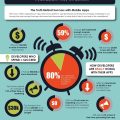Understanding Blockchain Technology: How It’s Changing the Financial World
Understanding Blockchain Technology: How It’s Changing the Financial World
As an entrepreneur or startup founder, you’ve likely heard of blockchain technology and its potential to disrupt the financial world. But what exactly is blockchain? And how is it changing the way we think about money, transactions, and security?
In this article, we’ll dive deep into the world of blockchain, exploring its history, key concepts, and real-world applications. By the end of this piece, you’ll have a solid understanding of blockchain technology and its far-reaching implications for the financial industry.
A Brief History of Blockchain
Blockchain technology was first introduced in 2008 by an individual or group of individuals using the pseudonym Satoshi Nakamoto. The initial concept was designed to support the development of Bitcoin, a decentralized digital currency that allows for peer-to-peer transactions without the need for intermediaries like banks.
However, it wasn’t until 2014 that blockchain started gaining mainstream attention, with the launch of Ethereum – a decentralized platform that enables the creation of smart contracts and decentralized applications (dApps).
Since then, blockchain has evolved into a global phenomenon, with numerous industries exploring its potential uses. Today, we’re seeing significant investments in blockchain research and development from major players like IBM, Microsoft, and Accenture.
Key Concepts: Understanding How Blockchain Works
Before we dive into the financial implications of blockchain, it’s essential to grasp some key concepts:
- Blocks: A block is a collection of transactions, each representing a transfer of value (e.g., cryptocurrency or data). These blocks are linked together using cryptography, creating a permanent and unalterable record.
- Chain: The chain refers to the sequence of blocks, each containing a unique code called a “hash” that connects it to the previous block. This creates an immutable ledger that ensures the integrity of all transactions.
- Distributed Ledger Technology (DLT): Blockchain is a type of DLT, which allows for multiple parties to record and verify transactions on a decentralized network. This eliminates the need for central authorities, like banks or governments.
- Consensus Mechanisms: To ensure the integrity of the blockchain, nodes on the network must agree on the state of the ledger through consensus mechanisms, such as proof-of-work (PoW) or proof-of-stake (PoS).
How Blockchain is Changing the Financial World
Now that we’ve covered the basics, let’s explore how blockchain technology is revolutionizing the financial industry:
- Decentralized and Secure Transactions: Blockchain enables secure, peer-to-peer transactions without intermediaries, reducing transaction costs and increasing efficiency.
- Increased Transparency: With a public ledger, all transactions are visible to anyone with access to the network, ensuring transparency and accountability.
- Reduced Counterparty Risk: By using smart contracts and decentralized escrow services, blockchain minimizes counterparty risk, making it ideal for cross-border transactions.
- New Asset Classes: Blockchain has given rise to new asset classes like security tokens, which represent ownership in assets like real estate or companies.
- Improved Identity Verification: Decentralized identity verification systems, like Self-Sovereign Identity (ERC-725), enable users to control their personal data and prove identity without relying on central authorities.
Real-World Applications: Blockchain in Finance
- Payment Systems: Companies like Ripple are using blockchain to facilitate fast and cheap cross-border payments.
- Supply Chain Management: Maersk, the world’s largest container shipping company, is utilizing blockchain to track shipments and reduce transit times.
- Digital Identity: Estonia, a Baltic country, has implemented a blockchain-based digital identity system for citizens, ensuring secure authentication and data protection.
- Security Token Offerings (STOs): Blockchain-based STOs have become increasingly popular, allowing companies to raise capital in a more efficient and transparent manner.
Challenges and Limitations
While blockchain technology holds immense promise, there are still challenges to overcome:
- Scalability: Many blockchain networks struggle with scalability, leading to slow transaction processing times and high fees.
- Regulation: The regulatory landscape for blockchain is still evolving, creating uncertainty for businesses and investors.
- Interoperability: Different blockchain platforms often have incompatible architecture, making it difficult for them to communicate seamlessly.
Conclusion
Blockchain technology has the potential to transform the financial world by increasing efficiency, transparency, and security. As entrepreneurs and startup founders, understanding the basics of blockchain is crucial for navigating this rapidly evolving landscape.
While challenges remain, the benefits of blockchain far outweigh its limitations. By embracing innovation and exploring new use cases, we can unlock the full potential of this groundbreaking technology.
What’s Next?
As blockchain continues to mature, we can expect to see:
- Increased Adoption: More businesses and governments will adopt blockchain solutions to improve efficiency and transparency.
- Advancements in Interoperability: Efforts to standardize blockchain architecture will lead to improved communication between different platforms.
- Growing Investment: As the regulatory environment clarifies, investments in blockchain research and development will continue to grow.
Stay ahead of the curve by following our blog for more articles on blockchain technology, startups, and entrepreneurship.








